Sleep Quality, Sleep Duration, and the Risk of Coronary Heart Disease: A Prospective Cohort Study With 60,586 Adults
- PMID: 29198294
- PMCID: PMC5734879
- DOI: 10.5664/jcsm.6894
Sleep Quality, Sleep Duration, and the Risk of Coronary Heart Disease: A Prospective Cohort Study With 60,586 Adults
Abstract
Study objectives: There is limited information on the relationship between risk of cardiovascular disease and the joint effects of sleep quality and sleep duration, especially from large, prospective, cohort studies. This study is to prospectively investigate the joint effects of sleep quality and sleep duration on the development of coronary heart disease.
Methods: This study examined 60,586 adults aged 40 years or older. A self-administered questionnaire was used to collect information on sleep quality and sleep duration as well as a wide range of potential confounders. Events of coronary heart disease were self-reported in subsequent medical examinations. Two types of Sleep Score (multiplicative and additive) were constructed to reflect the participants' sleep profiles, considering both sleep quality and sleep duration. The Cox regression model was used to estimate the hazard ratio (HR) and the 95% confidence interval (CI).
Results: A total of 2,740 participants (4.5%) reported new events of coronary heart disease at follow-up. For sleep duration, participants in the group of < 6 h/d was significantly associated with an increased risk of coronary heart disease (HR: 1.13, 95% CI: 1.04-1.23). However, the association in the participants with long sleep duration (> 8 h/d) did not reach statistical significance (HR: 1.11, 95% CI: 0.98-1.26). For sleep quality, both dreamy sleep (HR: 1.21, 95% CI: 1.10-1.32) and difficult to fall asleep/use of sleeping pills or drugs (HR: 1.40, 95% CI: 1.25-1.56) were associated with an increased risk of the disease. Participants in the lowest quartile of multiplicative Sleep Score (HR: 1.31, 95% CI: 1.16-1.47) and of additive sleep score (HR: 1.31, 95% CI: 1.16-1.47) were associated with increased risk of coronary heart disease compared with those in the highest quartile.
Conclusions: Both short sleep duration and poor sleep quality are associated with the risk of coronary heart disease. The association for long sleep duration does not reach statistical significance. Lower Sleep Score (poorer sleep profile) increases the risk of coronary heart disease, suggesting the importance of considering sleep duration and sleep quality together when developing strategies to improve sleep for cardiovascular disease prevention.
Keywords: cohort study; coronary heart disease; sleep duration; sleep quality; sleep score.
© 2018 American Academy of Sleep Medicine
Figures
References
-
- Fuster V, Kelly BB, Vedanthan R. Promoting global cardiovascular health: moving forward. Circulation. 2011;123(15):1671–1678. - PubMed
-
- Writing Group Members. Mozaffarian D, Benjamin EJ, Go AS, et al. Heart Disease and Stroke Statistics-2016 Update: A Report From the American Heart Association. Circulation. 2016;133(4):E38–E360. - PubMed
-
- Lee SW, Ng KY, Chin WK. The impact of sleep amount and sleep quality on glycemic control in type 2 diabetes: A systematic review and meta-analysis. Sleep Med Rev. 2017;31:91–101. - PubMed
-
- Howell D, Oliver TK, Keller-Olaman S, et al. Sleep disturbance in adults with cancer: a systematic review of evidence for best practices in assessment and management for clinical practice. Ann Oncol. 2014;25(4):791–800. - PubMed
Publication types
MeSH terms
LinkOut - more resources
Full Text Sources
Other Literature Sources
Medical
Molecular Biology Databases


